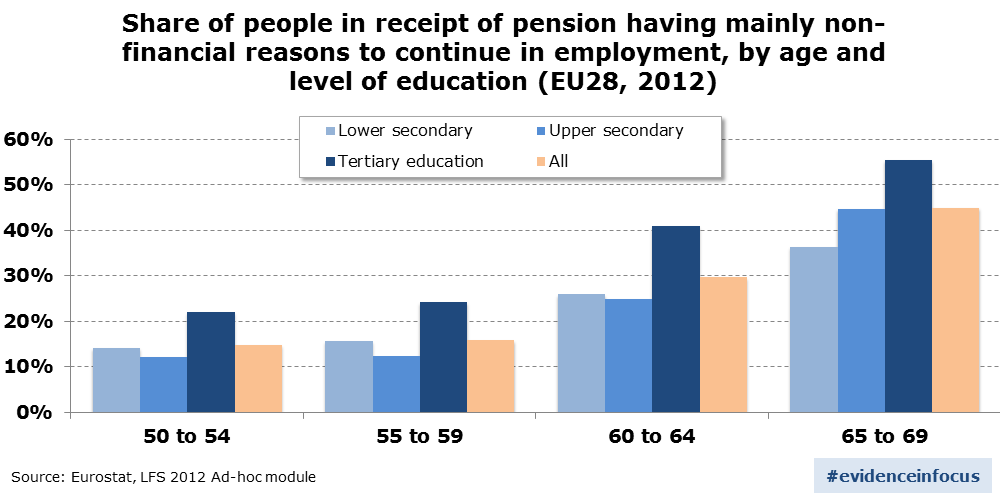The changing meaning of ‘working age’
(From ec.europa.eu)
The changing meaning of ‘working age’
© Ruslan Guzov / Shutterstock
‘Working age’ is usually defined as 15 to 64 years. This definition is for example used for the ‘old-age dependency ratio’, with people aged 65 and over being labelled ‘dependent’.
However, almost five million people over 65 were in employment in 2014, a remarkable increase of 48% from 3.3 million in 2004 to 4.9 million in 2014. The employment rate of people aged 65-69 has reached 11.7%; for the entire population over the age of 65, the employment rate reaches 5.5%.
Do older people work to make ends meet?
Almost all these workers aged 65 and over are entitled to some pension, and recent reforms that raise pension ages above 65 did not yet apply to this age cohort. So, why do these people work beyond age 65? Is it because they cannot make ends meet with their pensions?
Eurofound, the EU agency for the improvement of living and working conditions, found that earnings from work make up about 7% of the individual income of all people aged 65+, but for about two-fifths, it represents over 80% of their income. The fact that during the crisis the number of people aged 65+ in employment has risen sharply suggests that many need to work to make ends meet. However, this increase was not a disruption, but rather a continuation of a long-term trend.
Eurofound (2012; 2014) has estimated that roughly one fifth of people 65+ who are in employment work purely because of financial need. This estimate was based on the European Social Survey (ESS) 2010 which asked whether people ‘would work if they would not need the money’, and the European Quality of Life Survey (EQLS) 2011 results on work satisfaction. It was argued that for the other four-fifth, income may be an important factor contributing to their quality of life, but other factors also play a role; seeing work as a way to maintain social contacts, to continue self-actualisation, to remain active and healthy, and to contribute to society.
The Labour Force Survey’s (LFS) 2012 ad-hoc module on the transition from work into retirement finally provided the opportunity to mirror these observations with a robust EU28-wide indicator, asking people aged 50-69 about their ‘main reason’ for continuing in employment. The data confirm the heterogeneity of the group of working pensioners, but at first sight the number does not seem to tally with Eurofound's estimate: only 37% of pensioners report to continue working mainly for non-financial reasons.
However, the picture changes when one looks at various age groups separately (see chart). Non-financial motivations increase with age, and 45% of 65-69 year olds mainly work for non-financial reasons, ranging from below 10% in Greece and Romania to above 70% in Denmark and Sweden. It seems plausible that for most people it is a mix of reasons, and that in the group of people who work ‘mainly’ for financial reasons just over half would work for ‘purely’ financial reasons.
 Note: these are conservative estimates, because no answer/don’t knows were included as a separate category, and recipients of all types of pensions were included.
Note: these are conservative estimates, because no answer/don’t knows were included as a separate category, and recipients of all types of pensions were included.
Is working for non-financial reasons a privilege of an elite of older workers?
From previous research we know that people with higher skills are more likely to work after 65 years of age. However, in absolute numbers, most working pensioners are employed in low and medium skilled professions where one would expect people to work only for the money.
Earlier analysis of EQLS data suggested that this is not the case, with high average job satisfaction levels for 65+ workers with low and high incomes alike. Data from the LFS 2012 ad hoc module allow us to verify this result by looking at the importance of non-financial reasons among pensioners by level of education (see chart). People aged 65-69 with higher education more often work for non-financial reasons (55%), but there are sizeable proportions of older workers with low (36%) and medium (45%) education levels that do so as well.
What implications for the notion of 'working age'?
Clearly, the meaning of working age is changing – and this is not just because of pension reforms that raise the standard pension age. The upper limit of 65 does not reflect the reality anymore. A large and growing share of workers aged 65+ mainly work for non-financial reasons and this is not limited to the well-educated. For these people it is good news that the meaning of ‘working age’ is changing. However, there is also a sizeable group of people aged 65+ who work mainly because of financial needs and who have not managed to earn sufficient pension entitlements by the age of 65.
Author: H. Dubois works as a research manager in Eurofound.
The views expressed in this article are those of the authors and do not necessarily reflect the views of the European Commission.
Editor's note: this article is part of a regular series called "Evidence in focus", which will put the spotlight on key findings from past and on-going research at DG EMPL.